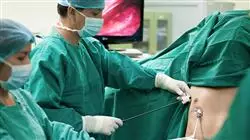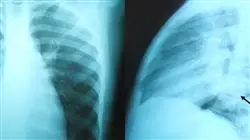University certificate
The world's largest faculty of medicine”
Introduction to the Program
The Postgraduate diploma in Lung Cancer, Tumors of the Pleura, Mediastinum and Thoracic Wall contains the most complete and up-to-date scientific program on the market"

Recent studies have reported a reduction in lung cancer mortality among current and former smokers with a minimum of 30 packs/year following the use of low-dose helical computed tomography, and have provided sufficient evidence to establish strong international recommendations for lung cancer prevention. Therefore, a more frequent future presentation of lung cancer will be via a solitary pulmonary nodule, a relevant fact given that diagnosis at advanced stages has been the norm in the last 30 years and the reason for the low prevalence of this disease.
On the other hand, the anti-smoking policies that have been implemented in the last decade are changing the profile of the patient who is usually seen in the office, and although it is not yet very evident, it will become more evident in the coming years.
Therefore, this program contains key and relevant topics for the near future in this field, such as the solitary pulmonary nodule.
Nowadays, to talk about Oncology is to talk about "multidisciplinary teams", about advances in fields of science that are increasingly involved, and this, apart from being interesting, makes continuous training necessary, which is often difficult to acquire in other specialization programs or congresses since they are oriented to a very specific area and specific to a single specialty. Not losing this multidisciplinary vision is very important because many advances in one area can have implications in the diagnostic and therapeutic algorithms used in oncology. In fact, one ability that TECH intends the students to achieve with this Postgraduate diploma is to have a broad and clear vision of Oncology, and to use the comparison of scientific advances in each area as a tool that will allow them to advance in knowledge.
Expand your knowledge through the Postgraduate diploma in Lung Cancer, Tumors of the Pleura, Mediastinum and Thoracic Wall, in a practical way and adapted to your needs”
This Postgraduate diploma in Lung Cancer, Tumors of the Pleura, Mediastinum and Thoracic Wall contains the most complete and up-to-date scientific program on the market. The most important features include:
- Clinical practical cases presented by experts in the different specialties
- The graphic, schematic, and practical contents with which they are created provide scientific and practical information on the disciplines that are essential for professional practice
- Latest developments in Lung Cancer, Tumors of the Pleura, Mediastinum, and Thoracic Wall
- An algorithm-based interactive learning system for decision-making in the clinical situations presented throughout the course
- With a special emphasis on evidence-based medicine and research methodologies in Lung Cancer, Tumors of the Pleura, Mediastinum and Thoracic Wall
- All of this will be complemented by theoretical lessons, questions to the expert, debate forums on controversial topics, and individual reflection assignments
- Content that is accessible from any fixed or portable device with an Internet connection
This Postgraduate diploma is the best investment you can make when selecting a refresher program, for two reasons: in addition to updating your knowledge in Lung Cancer, Tumors of the Pleura, Mediastinum and Thoracic Wall, you will obtain a qualification endorsed by TECH"
It includes in its teaching staff health professionals from the field of bioethics, who bring to this program the experience of their work, as well as recognized professionals belonging to other specialties.
Thanks to its multimedia content developed with the latest educational technology, it will allow the professional a situated and contextual learning, that is to say, a simulated environment that will provide an immersive learning programmed to study in real situations.
This program is designed around Problem-Based Learning, whereby the physician must try to solve the different professional practice situations that arise throughout the program. For this reason, they will be assisted by an innovative, interactive video system created by renowned and experienced experts in the field of thoracic oncology who have extensive teaching experience.
Increase your decision-making confidence by updating your knowledge with this Postgraduate diploma in Lung Cancer, Tumors of the Pleura, Mediastinum and Thoracic Wall"

Don't miss the opportunity to update your knowledge in Lung Cancer, Tumors of the Pleura, Mediastinum and Thoracic Wall to improve patient care"
Why study at TECH?
TECH is the world’s largest online university. With an impressive catalog of more than 14,000 university programs available in 11 languages, it is positioned as a leader in employability, with a 99% job placement rate. In addition, it relies on an enormous faculty of more than 6,000 professors of the highest international renown.

Study at the world's largest online university and guarantee your professional success. The future starts at TECH”
The world’s best online university according to FORBES
The prestigious Forbes magazine, specialized in business and finance, has highlighted TECH as “the world's best online university” This is what they have recently stated in an article in their digital edition in which they echo the success story of this institution, “thanks to the academic offer it provides, the selection of its teaching staff, and an innovative learning method aimed at educating the professionals of the future”
A revolutionary study method, a cutting-edge faculty and a practical focus: the key to TECH's success.
The most complete study plans on the university scene
TECH offers the most complete study plans on the university scene, with syllabuses that cover fundamental concepts and, at the same time, the main scientific advances in their specific scientific areas. In addition, these programs are continuously being updated to guarantee students the academic vanguard and the most in-demand professional skills. In this way, the university's qualifications provide its graduates with a significant advantage to propel their careers to success.
TECH offers the most comprehensive and intensive study plans on the current university scene.
A world-class teaching staff
TECH's teaching staff is made up of more than 6,000 professors with the highest international recognition. Professors, researchers and top executives of multinational companies, including Isaiah Covington, performance coach of the Boston Celtics; Magda Romanska, principal investigator at Harvard MetaLAB; Ignacio Wistumba, chairman of the department of translational molecular pathology at MD Anderson Cancer Center; and D.W. Pine, creative director of TIME magazine, among others.
Internationally renowned experts, specialized in different branches of Health, Technology, Communication and Business, form part of the TECH faculty.
A unique learning method
TECH is the first university to use Relearning in all its programs. It is the best online learning methodology, accredited with international teaching quality certifications, provided by prestigious educational agencies. In addition, this disruptive educational model is complemented with the “Case Method”, thereby setting up a unique online teaching strategy. Innovative teaching resources are also implemented, including detailed videos, infographics and interactive summaries.
TECH combines Relearning and the Case Method in all its university programs to guarantee excellent theoretical and practical learning, studying whenever and wherever you want.
The world's largest online university
TECH is the world’s largest online university. We are the largest educational institution, with the best and widest online educational catalog, one hundred percent online and covering the vast majority of areas of knowledge. We offer a large selection of our own degrees and accredited online undergraduate and postgraduate degrees. In total, more than 14,000 university degrees, in eleven different languages, make us the largest educational largest in the world.
TECH has the world's most extensive catalog of academic and official programs, available in more than 11 languages.
Google Premier Partner
The American technology giant has awarded TECH the Google Google Premier Partner badge. This award, which is only available to 3% of the world's companies, highlights the efficient, flexible and tailored experience that this university provides to students. The recognition as a Google Premier Partner not only accredits the maximum rigor, performance and investment in TECH's digital infrastructures, but also places this university as one of the world's leading technology companies.
Google has positioned TECH in the top 3% of the world's most important technology companies by awarding it its Google Premier Partner badge.
The official online university of the NBA
TECH is the official online university of the NBA. Thanks to our agreement with the biggest league in basketball, we offer our students exclusive university programs, as well as a wide variety of educational resources focused on the business of the league and other areas of the sports industry. Each program is made up of a uniquely designed syllabus and features exceptional guest hosts: professionals with a distinguished sports background who will offer their expertise on the most relevant topics.
TECH has been selected by the NBA, the world's top basketball league, as its official online university.
The top-rated university by its students
Students have positioned TECH as the world's top-rated university on the main review websites, with a highest rating of 4.9 out of 5, obtained from more than 1,000 reviews. These results consolidate TECH as the benchmark university institution at an international level, reflecting the excellence and positive impact of its educational model.” reflecting the excellence and positive impact of its educational model.”
TECH is the world’s top-rated university by its students.
Leaders in employability
TECH has managed to become the leading university in employability. 99% of its students obtain jobs in the academic field they have studied, within one year of completing any of the university's programs. A similar number achieve immediate career enhancement. All this thanks to a study methodology that bases its effectiveness on the acquisition of practical skills, which are absolutely necessary for professional development.
99% of TECH graduates find a job within a year of completing their studies.
Postgraduate Diploma in Lung Carcinoma, Tumors of the Pleura, Mediastinum and Thoracic Wall
Lung cancer (microcytic and non-small cell) is the second most common cancer affecting both men and women; it is usually caused by smoking, exposure to certain toxins or family history. Its symptoms are aggressive and existing treatments to date may vary from person to person; they include radiotherapy, surgery, immunotherapy, chemotherapy and targeted drug therapy. For this reason, professionals belonging to the medical sector remain at the forefront in order to strengthen their skills when providing personalized treatments to each patient. At TECH we designed a Postgraduate Diploma in Pulmonary Carcinoma, Tumors of the Pleura, Mediastinum and Thoracic Wall focused on obtaining a global and updated vision of thoracic oncology and all its aspects. This allows the student to acquire useful knowledge that helps to broaden their field of information to improve the daily practice of their work.
Get certified in the world's largest digital university
For six months you will take a fully online Postgraduate Certificate training course where you will learn to analyze the current landscape of lung cancer immunotherapy, including combinations in clinical development, dose selection strategies, pharmacology and regulatory considerations. You will also learn the therapeutic algorithm for the management of each of the different stages of thoracic tumors. Because of this, you will help improve the diagnosis and treatment of pathologies of lower incidence such as neuroendocrine tumors, mesothelioma or posterior mediastinal cysts. If you are passionate about this subject and want to specialize to become a high-level professional, enroll in TECH and highlight your career with the best tools.
Specialize in treating pathologies related to lung cancer.
This Postgraduate Diploma is focused on the diagnostic and therapeutic approach to microcytic carcinoma, non-small cell carcinoma and neuroendocrine tumors, among others. At TECH you will feel confident in receiving a high quality training that contains key and relevant topics in the field of solitary pulmonary nodule. In addition, we provide you with an interactive learning system based on algorithms that will allow you to make decisions in clinical situations; you will learn all this remotely and totally online.







